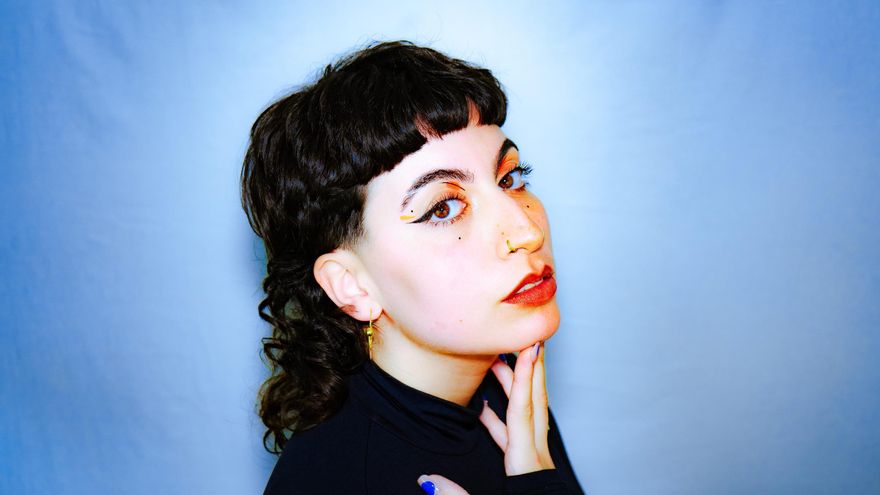
Poster Launch at the Monopol Music Festival (2025) with Sara Socas: Why is Tenerife a Thriving Ground for Rap?
The musical landscape between Gran Canaria and Tenerife is quite analogous, encompassing the entire spectrum, with some leaning towards mainstream and others more underground. From Gran Canaria, I particularly admire Samuraï and Sldo, whom I only recently discovered.
What can we expect from the main stage at Santa Catalina?
I’ll be performing with my friends, my band. Our first task was to convert all the instrumental tracks into a format suitable for the band. That was managed by my friends, using various equipment: Fernando Angulo, Manu Alles, Alberto Martín, and Héctor Izquierdo. We’ve rehearsed and listened to how it sounds, adjusting the setlist to our liking while ensuring it remains vibrant, with the four most impactful tracks placed towards the end.
Does Rial warrior always close your set?
It certainly does. There are two halves to the performance with Fernikhan from Veneno Crew and the band. When it comes to Rial warrior, I’m already feeling the pressure.
Your debut album, Temple (2023), has allowed you to step away from rap exclusively and explore deeper musicality, featuring contributions from your father and uncle. What significance does Temple hold in your career?
Since the release of my first track, Honey (2020), I’ve had the ambition to create this album. I wanted to explore various genres in which I felt comfortable. I documented it all on paper and kept it in my wallet until it was finally produced. It’s surreal to encapsulate everything on paper and then see it evolve into a project featuring my friends and family.
From a technical standpoint, how was this album crafted for your presentation in Gran Canaria?
It materialised at just the right time. The album was largely developed with Eva Moreno, Fernikhan, and Fernando Angulo, who plays drums in the band. Creating it was enjoyable, considering that we all worked about 40 hours a week at our jobs, and coordinating schedules, especially with Eva, who is a nurse, was quite challenging. At one point, I thought the album might never see the light of day.
What similarities do you share with C. Tangana, one of your role models?
Struggles, for sure. My ultimate inspiration is Mercedes Sosa.
Does your album nod to her?
Yes, there’s a waltz she covered, Small. That song began being sung to me when my mother was expecting.
And now you perform it as a duet with your father and uncle on guitar, reminiscent of a childhood lullaby.
We cover it just as she did. It has a sentimental aspect because my father sang it to me to help me sleep [laughs].
What outlook does Jela have now, especially as opportunities arise at festivals such as PHE, Boreal, and MMF?
Is your work more akin to a Mixtape, where tracks can be enjoyed individually, or a conceptual album?
I released the previous one as my introduction. Just the other day, while chatting with my mates, I gathered what I like to call the Council of Sages, and we concluded that, regardless of whether an album is conceptual or not, introspection comes first. I appreciate these demos because they resonate with me and allow me to express how I feel.
A few weeks ago, an international artist like Maluma captivated Santa Catalina’s Carnival stage. What are your thoughts on this as a Canarian artist stepping onto the same stage?
It’s quite paradoxical, although I’m not certain that’s the best term to describe it. This is something that occurs often, particularly during carnivals, which have come to embody who we are. People frequently rave about the carnival in Brazil and then refer to that of Tenerife. A considerable investment is made in bringing international artists over; it’s impressive but also disconcerting to fork out that kind of money.
Is there enough opportunities for Canarian talent in concerts? Should we enhance venues to support emerging musicians?
This is a complex equation involving various factors. Naturally, the venue model paves the way to festivals, and there needs to be many spaces available. It’s not just about having one in Las Palmas de Gran Canaria, another in La Laguna, and yet another in Santa Cruz de Tenerife. Culture should be decentralised, and the audience must be more accessible. There should be spaces for underground artists to showcase their work; if they aren’t supported, even minimally by having places to perform, they won’t progress to larger festivals. I believe that, at least here, there are festivals that acknowledge local talent. It would be amazing to have a macro-festival dedicated solely to Canarian performers.
What is lacking in the Canary Islands? Is it essential to go to Madrid for visibility?
I refuse to accept that one must go to Madrid. I don’t want to believe it because that would be disheartening for me. It’s already quite congested over there. One shouldn’t have to venture to Madrid as if they were in a scene from The Coyote Bar to pursue their dreams. You could easily find yourself in a job that leaves no time for music. The play could be a success, but I feel we should focus on promoting talent from the Canary Islands. I face challenges living here and a context that restricts my access to work or housing. I created Temple with the hope that the album would resonate with people, not solely out of love for the art, and that the project would open doors for me. I genuinely hope opportunities arise from beyond, but first, I wish to succeed in my own home.
















